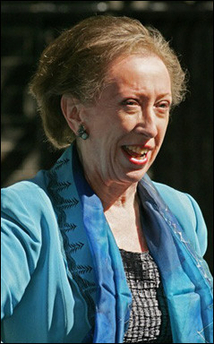Margaret Beckett's appointment as Britain's first female foreign secretary
means two of the world's most powerful diplomatic jobs are now held by women.

Former British
Secretary of State for the Environment, Food and Rural Affairs, Margaret
Beckett leaves 10 Downing Street in London. Beckett's appointment as
Britain's first female foreign secretary means two of the world's most
powerful diplomatic jobs are now held by women.
[AFP] |
The 63-year-old former environment secretary shares with US Secretary of
State
Condoleezza Rice the same steely determination and political
acumen with unflinching support for their bosses as well as an academic
background.
But whereas power-dressing singleton Rice combines the refined pleasures of
classical music with early-morning gym workouts, Beckett is more likely to be
found in a casual fleece jacket, pottering about in her caravan (camping
trailer) in the countryside with devoted husband Leo.
Known as the Labour Party's "great survivor" because of her stubborn refusal
to be cowed by setbacks, Beckett was born Margaret Mary Jackson in
Ashton-under-Lyne, near Manchester, northwest England, on January 15, 1943.
A qualified metallurgist, her political roots were cast while an apprentice
engineer following the Sharpeville massacre in March 1960 during the apartheid
era in South Africa.
After joining the powerful Transport and General Workers' Union (TGWU), to
which she has remained loyal for more than 40 years, she went on to become a
Labour Party researcher in 1970.
Four years years later, she fought, and narrowly lost, her first general
election for Labour. When another election was called seven months later, she
was victorious and represented Lincoln, eastern England, for six years.
When Conservative leader Margaret Thatcher became Britain's first woman prime
minister in 1979 in the wake of widespread disaffection at Labour's inability to
curb strikes and the economy, Beckett became a television researcher.
In the same year, she married her political mentor, Leo Beckett, then the
chairman of her local Labour Party.
By 1980, Beckett had began her ascent through the ranks of the embattled
Labour Party, becoming a member of its ruling National Executive Committee.
At the time, she was a noted left-winger, supporting the veteran Labour MP
Tony Benn in his bid for the party leadership in 1981.
In 1983, Beckett was back in parliament as MP for Derby South, in central
England, but began to moderate her views as the party sought to distance itself
from the "loony left" fringe that dogged its reputation in the 1980s.
By 1988, the now front-bench social security spokeswoman had switched
allegiances from Benn to Neil Kinnock in his successful bid for the leadership
and was rewarded with a shadow cabinet post in 1989.
She became the party's deputy leader in 1992 -- the first woman to hold the
post -- and was shadow leader of the House of Commons during the late John
Smith's prematurely short tenure as Labour leader.
When Smith died suddenly of a heart attack in 1994, she became acting party
leader, but was pipped for selection in the subsequent leadership campaign by
Tony Blair, even though Labour's popularity was soaring under her
stewardship.
Blair appointed Beckett his trade and industry secretary following Labour's
landslide 1997 election win and Leader of the House of Commons in 1998, where
she remained until being handed the tricky environment brief in 2001.
During that time, she has juggled a wide-ranging portfolio of issues from
climate change to animal health and attracted the ire of British farmers, who
accuse her of failing to stand up for their rights to foreign competitors.
But Beckett -- dubbed Rosa Klebb by satirical magazine Private Eye after the
James Bond villain -- has rebuffed critics with the stubborn fierceness culled
from years of political disappointment.